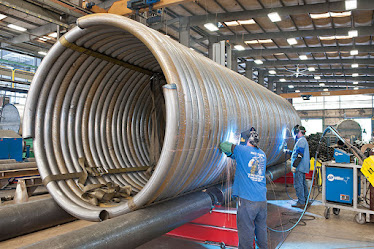Efficiency Unleashed: Exploring the Power of Thermal Fluid Heaters and Stainless Steel Heat Exchangers
In the realm of industrial heating solutions, thermal fluid heaters and stainless steel heat exchangers stand out as key players, offering unparalleled efficiency and reliability. This article delves into the world of thermal fluid heaters and stainless steel heat exchangers, exploring their functionalities, advantages, and frequently asked questions.
Understanding Thermal Fluid Heaters
Thermal fluid heaters are industrial devices designed for the efficient heating of a fluid, commonly referred to as a thermal fluid. Unlike traditional steam boilers, these heaters utilize a specialized heat transfer fluid to carry and distribute heat throughout a system. The key components of a thermal fluid heater include the heater itself, an expansion tank, a circulation pump, and a control system.
The Inner Workings of Stainless Steel Heat Exchangers
Stainless steel heat exchangers play a crucial role in the thermal fluid heating process. These exchangers are known for their durability, corrosion resistance, and ability to withstand high temperatures. The principle behind their operation involves transferring heat from one fluid to another without the fluids coming into direct contact. This not only ensures efficient heat transfer but also prevents contamination.
Advantages of Thermal Fluid Heaters
Energy Efficiency
Thermal fluid heaters excel in energy efficiency due to their closed-loop system. The heat transfer fluid can reach higher temperatures without the risk of vaporization or scaling, resulting in improved overall efficiency compared to traditional steam boilers.
Precision Temperature Control
The closed-loop design also allows for precise temperature control, catering to the specific requirements of various industrial processes. This feature is particularly valuable in applications where maintaining a stable temperature is critical.
Safety and Low Maintenance
Thermal fluid heaters are inherently safer than steam boilers, as they operate at lower pressures. Additionally, the absence of water eliminates the risk of explosions associated with steam systems. The low maintenance requirements further contribute to their appeal, making them a cost-effective solution for many industries.
Benefits of Stainless Steel Heat Exchangers
Corrosion Resistance
One of the primary advantages of stainless steel heat exchangers is their exceptional corrosion resistance. This property ensures a longer lifespan and reliable performance in harsh industrial environments, where exposure to corrosive substances is common.
High Thermal Conductivity
Stainless steel is renowned for its high thermal conductivity, facilitating efficient heat transfer between fluids. This characteristic allows for quick and effective heating or cooling processes, enhancing the overall performance of the system.
Hygienic Properties
In industries such as food and pharmaceuticals, maintaining a high level of hygiene is paramount. Stainless steel heat exchangers are ideal for such applications, as they are easy to clean and do not impart any contaminants to the fluids they handle.
Frequently Asked Questions (FAQ)
Q1: What type of fluids can be used in thermal fluid heaters?
A1: Thermal fluid heaters are versatile and can accommodate various heat transfer fluids, including mineral oils, synthetic oils, and glycols. The choice of fluid depends on the specific requirements of the application and the desired temperature range.
Q2: Are thermal fluid heaters more efficient than steam boilers?
A2: Yes, thermal fluid heaters are generally more energy-efficient than steam boilers. Their closed-loop system allows for higher operating temperatures without the drawbacks associated with steam, resulting in improved overall efficiency.
Q3: Can stainless steel heat exchangers be used in corrosive environments?
A3: Yes, stainless steel heat exchangers are well-suited for corrosive environments. The corrosion resistance of stainless steel ensures longevity and reliable performance even in challenging industrial settings.
Q4: How often do stainless steel heat exchangers need maintenance?
A4: Stainless steel heat exchangers are known for their low maintenance requirements. Regular inspections and cleaning are recommended, but the frequency depends on the specific operating conditions and the substances being processed.
Q5: Can thermal fluid heaters be used for both heating and cooling processes?
A5: Yes, thermal fluid heaters can be employed for both heating and cooling applications. The versatility of these systems makes them suitable for a wide range of industrial processes.
Conclusion
Thermal fluid heaters and stainless steel heat exchangers emerge as a dynamic duo in the realm of industrial heating. Their energy efficiency, precise temperature control, safety features, and durability make them indispensable for a variety of applications. As industries continue to seek sustainable and reliable solutions, the combination of thermal fluid heaters and stainless steel heat exchangers is poised to play a pivotal role in shaping the future of industrial heating systems.




Comments
Post a Comment